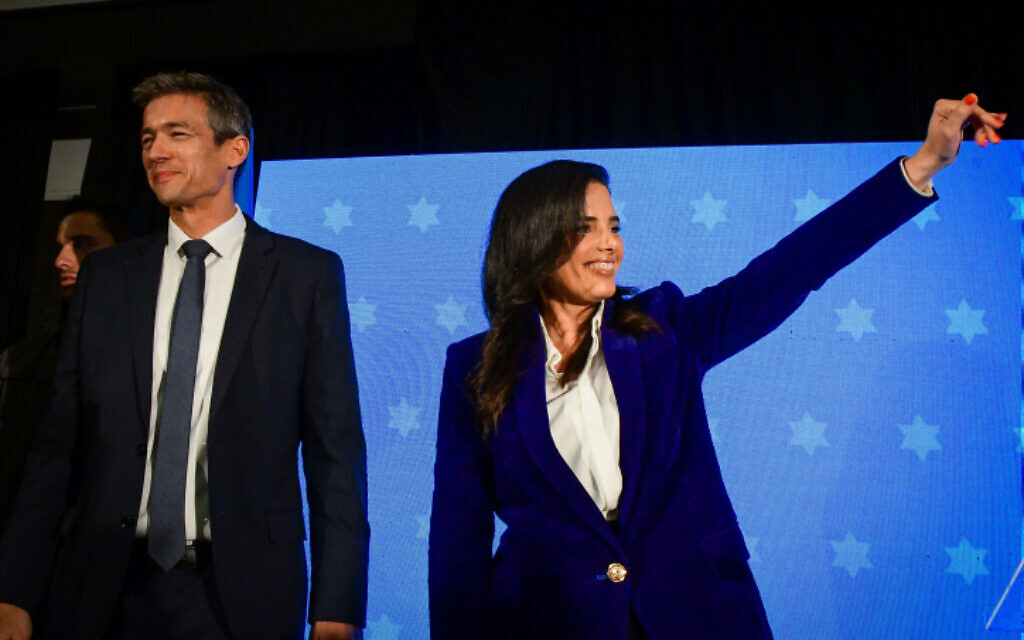After faction leaders Shaked and Hendel unify to raise both of their political fortunes, their unity government appeal might put them in position to crown Israel’s next leader

Despite the festive atmosphere surrounding the launch of the right-wing Zionist Spirit joint slate Wednesday, for many the move smacked of desperation, with two politicians left stranded amid Israel’s stormy political waters grabbing onto each other to stay afloat.
Both Ayelet Shaked’s Yamina and Yoaz Hendel’s Derech Eretz parties are struggling to find a voter base, and it’s not immediately clear if their unified Zionist Spirit slate will present a compelling enough offering to win supporters back before the November 1 Knesset election.
Shaked and Hendel told voters on Wednesday night that the new party’s aspiration is to end “polarization” and narrow coalitions resting on “extremists” by building a broad, Zionist government with both Benjamin Netanyahu’s Likud party and the center-left.
If it can successfully straddle the seemingly insuperable divide between yes and no to former prime minister Netanyahu, the party has the potential to play surprise kingmaker — provided it can make its way into the Knesset.
The politically peripatetic Hendel comes to the alliance with lawmaker Zvi Hauser, after the two were left out of a merger between their former partner New Hope and Blue and White. Shaked inherited a shell of a party hollowed out by a year of internal struggles that culminated with former prime minister Naftali Bennett stepping away from politics. Neither faction has much of a base and Zionist Spirit may struggle to compete in a crowded field of fellow right-leaning parties.
A poll published by Channel 12 news Thursday night showed the party eking out four seats, though surveys directly after a major announcement or event can often be skewed by the buzz. According to that survey, Zionist Spirit would win four seats and, if joining the Netanyahu bloc, would lift it to a narrow-majority 61 seats in the 120-member Knesset.
Whereas Yamina won seven seats in the March 2021 election, support for the party has plummeted, with Likud, Religious Zionism, and Blue and White predicted to pick up most of their fleeing voters.
Yamina’s voters are split down the middle with regard to sitting under Netanyahu, according to political commentators. Strikingly, so too are Shaked and Hendel, who delayed their unification while hammering out details regarding whether to ally with the Likud leader and where to slot each other’s allies in the party’s list.

If Zionist Spirit breaks toward or away from Netanyahu, it could lose essential support from voters casting ballots based on a party’s likelihood of cooperating with Likud.
Their solution – as announced by Hendel on Wednesday – attempted to thread the needle by saying that Zionist Spirit is aiming to sit with everyone, placing the onus on Likud and the center-left to agree to an improbable coalition. Assuming they do not, and depending on how the election shakes out, it also positions Zionist Spirit as a potential kingmaker who could sit with Netanyahu or his rivals, a tactic utilized by Yamina in the last election.
Anti-Netanyahu parties have warned that if Netanyahu were to win, he could alter the legal system such that he could escape his ongoing corruption trial. His party has sought to give the Knesset more control of Supreme Court appointments (a move also supported by Shaked and others on the right for reasons unrelated to the Likud leader) and has threatened to swap out the attorney general.
Voters appear to care about the issue; data from pollster Rafi Smith shared with The Times of Israel shows that support for Likud itself could drop by 2.3% if Netanyahu pursued such a move.
Even if Netanyahu somehow secured a ruling coalition with Zionist Spirit’s help, Hendel made clear at Wednesday’s launch party that Zionist Spirit will not let Netanyahu’s side “fire the attorney general, stop the trial, and [promote] many more issues that are only related to one person.”

In an election that can turn on a single seat, Hendel alone could potentially block any potential Netanyahu move, even if the two were coalition partners.
This could make Zionist Spirit an attractive option for voters who are not opposed to Likud rule, but also do not want to see the judicial system changed in service of Netanyahu. And it has left itself with options should a center-left coalition become more realistic.
The party successfully set up a tightrope between the pro- and anti-Netanyahu crowds Wednesday night. Now voters will wait to see if it can keep its balance as it carefully toes its way across the breach.
As reported by The Times of Israel
